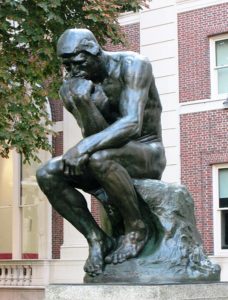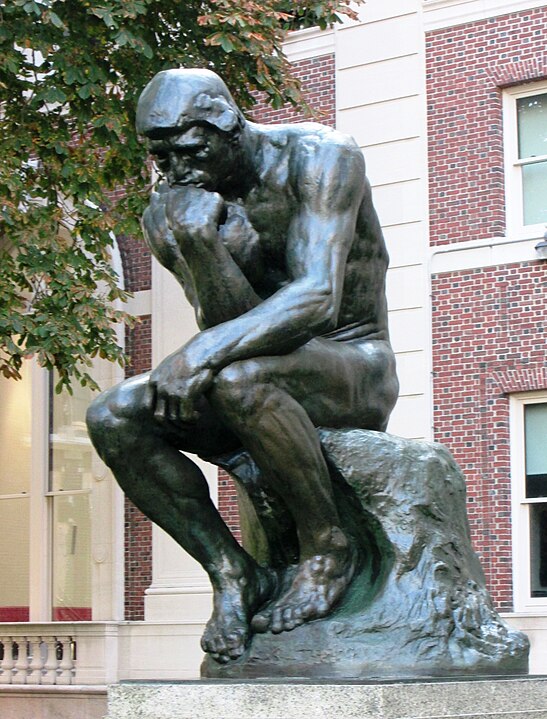
Is “I think therefore I am” true? Probably.
“I think therefore I am” is probably the most famous philosophical quotation of all time. It is probably the only one that most people will have heard of. It was coined by René Descartes in 1637. He was born in France in 1596 and he was a philosopher, scientist, and mathematician. Most of us only know him as a philosopher, but he considered himself a mathematician first, a scientist second, and a philosopher third. He created and discovered many things in math that we use today, but nobody knows it was Descartes. He was the first person to use x in algebra. He used x, y, and z for unknowns and a, b, and c for knowns. Still, it is for his “I think therefore I am” that he is remembered.
His actual phrase was written in Latin and was “Cogito, ergo sum,” which translates more closely as “I am thinking, therefore I exist”. Descartes was trying to find something that was unarguably certain. He was a mathematician and he believed that all knowledge had to be based on truths that were solid. He said that if there was even the slightest doubt in the fundamentals, everything had to be discarded because it must be wrong. This is known as methodic doubt and it is a way of finding certainty by doubting everything. The idea is that by eliminating everything that is false, the truth will remain. So, Descartes was looking for something that must be true. He started to think about what he knew to be true and what he could trust. He goes through all of the things he knows and all of the things he can see and he realizes that he can’t trust any of them. We experience the world through our senses, but we know from experience that we cannot trust our senses. We see, hear, feel, smell, and taste in our dreams, when we are obviously not really experiencing something, so how can we trust our senses when we are awake? He can’t even know that he is awake and not in the middle of a very vivid dream. He continues to eliminate everything until all he is left with is the fact that he is thinking these thoughts. If he is thinking, then he must exist. That must be true. That must be the basic foundation of everything. He then goes about rebuilding everything by using this foundation. But, is “I think, therefore I am” true?
The first logical problem is to say, “how do we know we are thinking?” If we cannot trust our own senses or knowledge, how do we know that we are thinking? A movie like the Matrix has given us the idea that we could all be parts of a complex computer program. My head could be running a simulation of thinking, in which case, am I thinking? And what if I am made up of a neural network consisting of nanobots instead of neurons. Am I thinking? Or are we thinking? Or are they thinking? The problem with the whole premise is that we have to assume we are thinking, so say we are thinking. Descartes perhaps meant the expression to be closer to “I doubt, therefore I am” and that seems to be a good way to decide if the phrase is true or not.
AI systems are improving day by day and they are becoming an integral part of our lives. Now, none of these systems are sentient and we may or may not ever have fully sentient AI. There is no way of knowing that. However, the question we need to ask is does AI think and what is thinking? The thoughts that take place in our heads are all driven by the neurons and the chemicals and the electricity that is in our brains. We can see it firing when we think. We don’t know what consciousness is, but we can see it working. We know that animals think, but we’re pretty sure they don’t think to the level that we do. And we can’t be sure, but it seems as though AI units are thinking. They are certainly processing commands based on their experiences and what they have learned, which is kind of what we do when we thinking. But, AI doesn’t yet have the ability to doubt. It can learn from its mistakes, but it cannot doubt itself or doubt its commands. Likewise, animals don’t doubt. They can be unsure and nervous, but they don’t doubt.
So, is “I think, therefore I am” true? I have no idea. I doubt my senses, but I could be living in a computer program where I have been programmed to doubt my senses. I could be a form of AI that is just simulating thinking. I don’t think there is any way we will ever know. Which means that there are no concrete truths in this world. And this is what I learned today.
Image By Beyond My Ken – Own work, CC BY-SA 4.0, https://commons.wikimedia.org/w/index.php?curid=37894350
Sources
https://plato.stanford.edu/entries/descartes/
https://en.wikipedia.org/wiki/Ren%C3%A9_Descartes
https://www.britannica.com/topic/methodic-doubt
https://philosophybreak.com/articles/i-think-therefore-i-am-descartes-cogito-ergo-sum-explained/
https://philosophy.stackexchange.com/questions/70/could-cogito-ergo-sum-possibly-be-false
https://en.wikipedia.org/wiki/Cogito,_ergo_sum

